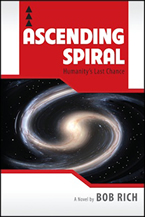Article first published as Ascending Spiral: Humanity's Last Chance by Bob Rich on Blogcritics.
August 14, 2014
Ascending Spiral:
Humanity’s Last Chance
Bob Rich
Marvelous Spirit Press (2013)
ISBN: 97816156991860 (paperback)
97816156991877 (ebook)
Novel Blends Reincarnation with Call for Change
 I have long been interested in reincarnation and have referred to it in some of my own novels, so I was really excited to read Australian author Bob Rich’s novel Ascending Spiral. While most novels only focus on a main character remembering one past life, Rich’s main character, Dr. Pip Lipkin, experiences multiple lives and multiple life forms, which make for fascinating reading, keep the storyline moving forward, and result in some interesting connections between Pip’s various incarnations over his 12,000 years of existence.
I have long been interested in reincarnation and have referred to it in some of my own novels, so I was really excited to read Australian author Bob Rich’s novel Ascending Spiral. While most novels only focus on a main character remembering one past life, Rich’s main character, Dr. Pip Lipkin, experiences multiple lives and multiple life forms, which make for fascinating reading, keep the storyline moving forward, and result in some interesting connections between Pip’s various incarnations over his 12,000 years of existence.
The impetus behind Pip’s multiple lives is the concept of karma. Early in his existence, Pip makes a grievous error that requires him to work out his karmic debt—a debt, however, that is not so much a punishment as an opportunity to learn, grow, and use his experiences as a means to teach others how to heal their own pain and suffering.
I won’t give away the plot or discuss all the lives Pip experiences, but some of the more significant ones include being an Irishman in the late eighteenth century who fights against the British; being the wife of an Australian landowner in the nineteenth century, and being an intelligent walking plant on another planet. Each time Pip dies, he has a guide who assists him in reviewing his life and discussing what he has learned, both in that life and in relation to other past lives. Pip then chooses what he wants in the next life, not specifically saying he wants to be a female or a plant, but rather making statements such as that he wants to live a life where there is no hate, gender, or causes of division such as religion or race. Each time, his choices result in new and often unexpected learning experiences that make for entertaining and meaningful reading.
Being an American reader who has never been to Australia, I also enjoyed Ascending Spiral’s depiction of Australia and its history. Pip’s life as Amelia in the nineteenth century on a farm with Aborigine workers reminded me a lot of slavery on plantations in the American South during the same period. I also thoroughly enjoyed Rich’s depiction of Pip’s life as a walking plant on another planet, which offered a very imaginative new perspective few of us can conceive of experiencing.
Finally, I have to mention the reason for Ascending Spiral’s subtitle, “Humanity’s Last Chance.” Reincarnation has a purpose, and for Pip, it is so he can eventually reach a point of warning people to change before it is too late for them and the earth. I won’t go into details about the book’s message, but a couple of statements that really struck me were “Economic growth is a cancer. We need to cure our addiction to it” and the need for us to change our mindset of “I want happiness now” to “I want a decent life for me, you and everyone else in harmony.”
A lot of nonfiction books exist about reincarnation, but Ascending Spiral shows that fiction can create a more poignant experience for the reader than just reading about a topic. The novel takes the theory of reincarnation and applies it so we journey with Pip over the millennia and come to a better understanding of our own souls and purposes. It is an understanding and experience more of us need to have.
For more information about Bob Rich and Ascending Spiral, visit http://bobswriting.com/ascending.html.
— Tyler R. Tichelaar, Ph.D., and award-winning author of Spirit of the North and Narrow Lives

